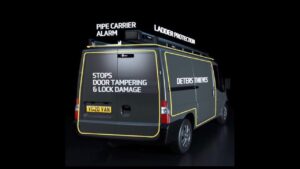

For motorhome enthusiasts, their vehicle is more than just a mode of transport; it is a home on wheels. As with any home, ensuring its security is of paramount importance. This understanding brings into focus the need for a motorhome security alarm and the risks associated with not having one.
A motorhome is not only a significant financial investment, but it also usually contains personal belongings that have both monetary and sentimental value. This makes it an attractive target for potential thieves. A robust motorhome security alarm is therefore vital in protecting your motorhome from break-ins and thefts.
An efficient security alarm system can act as a strong deterrent against burglars. In the event of a breach, the alarm will sound, alerting you and possibly scaring off the intruder. Furthermore, some advanced security systems can even notify you remotely in case of any security threats. This gives you the ability to react promptly, even when you’re not physically present in your motorhome.
You can explore more about the different types of alarms on our motorhome alarm system page.
![]()
The absence of a motorhome security alarm significantly increases the vulnerability of your vehicle to theft or damage. Without an alarm in place, an intruder can easily gain access to your motorhome without drawing attention. This could result in substantial financial loss and emotional distress.
Moreover, insurance companies often offer lower premiums to motorhome owners with comprehensive security systems. Thus, not having an alarm could also mean paying more for your motorhome insurance.
Motorhomes are generally equipped with standard locks, but these can only provide a basic level of protection and are often easy to bypass for experienced thieves. Therefore, investing in an additional security measure like a wireless motorhome alarm is a smart decision.
In conclusion, incorporating a security alarm into your motorhome is a crucial step towards ensuring your vehicle’s safety. It acts as a first line of defence against potential intruders, providing peace of mind whether you’re on the road or parked up for the night. In the following sections, we will delve deeper into the various types of motorhome alarms and their features.
Choosing the right motorhome security alarm can be a daunting task given the different types available in the market. To make an informed decision, let’s explore the basic, advanced, and smart security systems that are commonly used to protect motorhomes.
Basic security systems for motorhomes often consist of simple door and window sensors that trigger an alarm when breached. These systems may also include motion detectors, which can sense movement within the motorhome when activated.
While basic security systems can provide a certain level of protection, they often lack the more sophisticated features found in advanced and smart security systems. However, they can serve as a cost-effective solution for those who only require a basic level of security for their motorhome.
Advanced security systems typically offer a wider range of protection measures compared to basic systems. These may include glass break sensors, shock sensors, and tilt sensors, which can detect attempts to break windows, force entry, or tow the motorhome away.
Additionally, advanced security systems usually come with a louder siren alarm and may offer features like panic buttons and remote controls. Some advanced systems may also incorporate a GSM dialler, which can automatically send a text alert or call a pre-programmed number when the alarm is triggered.
For more information on advanced security systems, check out our article on motorhome alarm system.
Smart security systems represent the latest in motorhome security technology. These systems provide all the features of advanced alarms, paired with the convenience of smartphone integration. Owners can monitor and control their motorhome’s security system remotely through a dedicated app.
Smart security systems often include features such as real-time alerts, GPS tracking, and even the ability to view live video footage from security cameras installed in the motorhome.
Many smart security systems are also compatible with other smart devices, allowing for seamless integration into a broader home security ecosystem. For example, a smart motorhome alarm could be linked to a smart door lock, enabling remote locking and unlocking of the motorhome’s doors.
One of the most significant advantages of smart security systems is the ability to receive instant notifications about potential security threats, no matter where you are. This allows for quick response to any security incidents and provides peace of mind when you’re away from your motorhome.
For more details on smart security systems, visit our article on wireless motorhome alarm.
In conclusion, the type of motorhome security system that’s best for you depends on your specific needs and budget. Whether you choose a basic, advanced, or smart system, remember that any security system is better than none at all.
Investing in a motorhome security alarm requires careful consideration of its features. These attributes define the effectiveness and utility of the alarm system in providing the necessary protection for your motorhome. Here, we delve into four primary features: entry sensors, siren alarms, remote control, and GPS tracking.
Entry sensors are fundamental components of any alarm system, including those for motorhomes. These sensors detect when a door or window is opened, triggering the alarm. Some systems have additional sensors that can detect glass breakage or movement within the motorhome. These added layers of protection can provide peace of mind when you are away from your vehicle.
The audible alert of a siren alarm acts as a strong deterrent for potential intruders. The loud noise can draw attention to any unauthorised attempts to access your motorhome, possibly scaring off the intruder. The volume of the siren alarm is a crucial aspect to consider. A louder alarm can be more effective, but it’s essential to balance this with the potential for disturbing others in a quiet campsite.
A remote control for your motorhome alarm system allows for convenient arming and disarming of the system. Some systems offer key fob controls, while others may provide smartphone app controls. A remote control can also include a panic button, allowing you to manually activate the alarm if needed. For more information about a wireless motorhome alarm with remote control features, you can read our article here.
![]()
A GPS tracking feature in your motorhome alarm system can provide an additional layer of security. This feature allows you to monitor the location of your motorhome in real-time. If your motorhome is moved without your knowledge, the GPS tracking system can help you and the authorities locate it quickly.
| Features | Description |
|---|---|
| Entry Sensors | Detects when a door or window is opened |
| Siren Alarms | Emits a loud noise to deter intruders |
| Remote Control | Allows for convenient control of the alarm system |
| GPS Tracking | Monitors the location of your motorhome in real-time |
Selecting a motorhome security alarm with these features can help provide comprehensive protection for your vehicle. It’s important to consider these features in line with your specific security needs and preferences. For a deeper understanding of motorhome alarm systems, consider exploring our article on motorhome alarm system.
Investing in a motorhome security alarm is only half the battle. The other half lies in its proper installation, which ensures the alarm functions correctly and provides the desired level of security. There are two approaches to installing a security alarm in your motorhome: DIY installation and professional installation.
In a DIY installation, the owner of the motorhome takes the responsibility of installing the alarm system. This approach can be cost-effective, provided you have the necessary skills and understanding of the motorhome’s electrical system.
Installing a basic or wireless motorhome alarm can be relatively straightforward. It typically involves mounting the alarm control panel, positioning the sensors at potential entry points, and connecting the system to a power source. Always refer to the manufacturer’s instructions for specifics on where to place components and how to properly wire the system.
However, DIY installation does have its challenges. It requires a fair degree of technical knowledge and familiarity with the motorhome’s wiring. Incorrect installation could lead to the alarm system failing to operate as intended or even causing damage to the motorhome’s electrical system.
Professional installation involves hiring a qualified technician to install the alarm system. This approach ensures that the security system is installed correctly and functioning as intended. A professional installer can also provide valuable advice on the optimal placement of sensors and other components to maximize the effectiveness of the alarm system.
While professional installation might cost more upfront, it can save you from potential issues down the line. A professional installer will have the necessary tools and expertise to carry out the installation efficiently and safely, minimizing the risk of damage to your motorhome. They can also provide a demonstration of how to use the system, ensuring you’re confident in operating your new alarm.
Whether you choose DIY or professional installation for your motorhome alarm system, it’s important to test the system thoroughly after installation to ensure it’s working correctly. Remember, the effectiveness of a motorhome security alarm hinges not only on its quality but also on its proper installation and use.
Even with the best motorhome security alarm installed, there are additional measures you can take to enhance the security of your vehicle. This section will provide you with tips on regular maintenance of your alarm system, combining alarm systems with other security measures, and educating yourself on common security threats.
Maintaining your motorhome alarm system is a crucial step in ensuring its effectiveness. It is advisable to periodically check the system’s components, such as sensors and batteries, to ensure they are working properly. If your alarm system has a remote control or uses a mobile app, make sure it is updated to the latest version to benefit from any new security features or improvements.
Additionally, it would be beneficial to have your motorhome alarm system inspected by a professional annually. They can detect any potential issues and rectify them before they impact the system’s performance. For more details on maintaining your alarm system, consider reading our detailed guide on motorhome alarm system.
While a security alarm is an excellent deterrent for potential thieves, combining it with other security measures can provide an added layer of protection. Consider using a combination of mechanical locks, wheel clamps, and tracking devices along with your security alarm.
For instance, a wireless motorhome alarm can send you alerts in real-time if an unauthorized entry is detected, while a wheel clamp can physically deter thieves from moving your motorhome. Check out our article on wireless motorhome alarm for more information.
| Security Measure | Description |
|---|---|
| Mechanical Locks | Additional locks installed on the doors and windows of the motorhome |
| Wheel Clamps | Physical devices attached to the wheels to prevent movement |
| Tracking Devices | GPS devices installed in the motorhome to track its location |
Understanding common security threats can help you take proactive measures to protect your motorhome. Be aware of potential signs of a break-in, such as damage to locks or windows. Additionally, keep yourself updated about any recent thefts or security breaches in the areas you frequent with your motorhome.
Remember, the goal is not to make your motorhome completely impregnable – that’s nearly impossible. Instead, aim to make it a less attractive target for potential thieves. The more obstacles you place in their path, the more likely they are to move on to an easier target.

Michael Horsfall, a seasoned plumbing and heating engineer with over 35 years of trade experience, is the innovative mind behind VanGuardian, a proactive van security solution. His journey into the realm of security was triggered by recurrent incidents of theft, particularly copper pipe theft right from outside his residence in Leeds. The rampant van crimes led him to envision VanGuardian, a patented alarm system engineered to deter theft by activating upon contact, safeguarding assets before any damage occurs. Michael's in-depth understanding of the challenges faced by tradesmen, paired with his endeavor on Dragons' Den to secure investment, underscores his commitment to fostering van safety. His profound expertise and real-world experience equip him with a distinctive insight, making his blogs an invaluable resource for individuals seeking pragmatic advice on van safety and security.

Copyright © 2021 VANGUARDIAN
VANGUARDIAN is a registered trademark of PROTEK-ONE, company no. 11802780.
